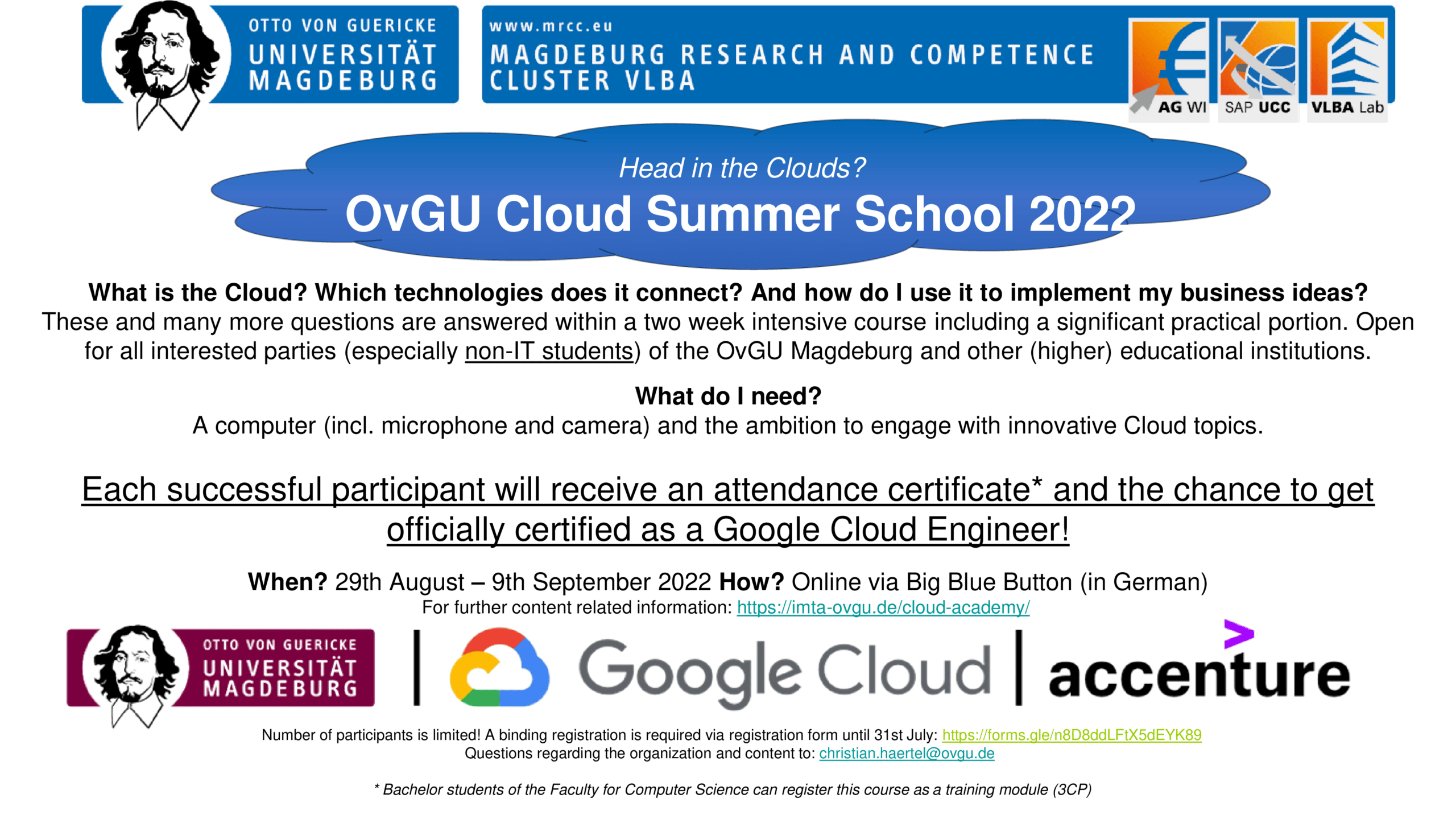The Cloud Academy is launched together by Accenture, Google Cloud and the University of Magdeburg OVGU.
Dialogue on the Key Objectives of new “Cloud First SAP Innovation Program” and “Cloud Academy”
By Christina Raab, Market Unit Lead Accenture ASGR (GMC Member/Board of Accenture), and Prof. Dr. Alexander Zeier, Chief Technology Officer of SAP Business Group and 1. Cloud Fellow of Accenture.

Content:
1. How important is excellent university research for the new “Cloud First SAP Innovation Program”?
2. What is the “Cloud Academy”?
3. How important is the cloud for competitiveness?
4. What challenges do companies face in the Corona Pandemic?
5. What does the “Enterprise Cloud Initiative” mean as the second pillar of the “Cloud First SAP Innovation Program”?
6. To what extent does the Cloud First SAP Innovation Program combine different Accenture priorities?
Short Summary: The Cloud Academy is a research and education cooperation for training and education. Thanks to this academy, future experts benefit from a cloud-specific curriculum and can be certified according to market standards.
Why: The companies must quickly adapt their business to a drastically changing market situation. To achieve this, companies need a “New Digital Core” and a so-called “Composable Enterprise Architecture” (ref. to Gartner), which is part of the classes of the Cloud Academy. In many cases a Lean Digital Core (LDC) on S/4Hana serves as the foundation, extended with cloud-native extensions and applications to enable innovation, and drive digital transformation.
Within this newly formed Cloud Academy, ambitious students are taught about general concepts of Cloud Computing, the setup and use of a Cloud and corresponding resources as well as the most recent technologies, not only in a theoretical but also practical way. In doing so the most recent changes of this domain are considered and implemented, especially in combined use with SAP.
Lectures and Exercises
In-Memory and Cloud Technology 3
Generally, this lecture is dedicated to examining the potential of integrating cloud technologies with conventional ERP systems. The goal is to systematically point out the potential of hybrid architectures to gain new business insights, support business processes, and improve overall performance. The main narrative of such integration is discussed by demonstrating different industrial use-cases. Therefore, basic cloud concepts, technological aspects, and challenges are discussed initially. Afterward, the transition from SAP ECC to S/4 HANA as the current direction is outlined. With S/4 HANA also being available as a cloud solution, the concept of cloud-first and its advantages are discussed. This leads to the profound discussion of the integration of SAP solutions and Google Cloud Platform (GCP). The corresponding exercise conveys the necessary practical knowledge to work with important tools of the GCP (e.g. Pub/Sub, Cloud Spanner, Big Query). For further lectures I am providing, please see: Lectures
Very Large Business Applications II
This course allows students to acquire techniques and skills for the development and implementation of complex system landscapes. Additionally, methods for the management of in-company and outsourcing data centers are presented. The lecture also focuses on Cloud Computing with the introduction of Cloud patterns. Participants also develop practical skills while progressing through the Coursera Associate Cloud Engineer Training for GCP. Then, the students utilize the learned capabilities to self-reliantly complete a complex use case scenario with the technologies of the Google Cloud Platform.
Summer and Winter Schools

The growth of the Cloud Computing market is steadily increasing (+41% alone in 2019-2020). Accordingly, Cloud Computing skills belong to today’s most sought-after and required qualifications. The summer and winter schools present two-week intensive courses focusing on Cloud Computing and Cloud Engineering. Students acquire general information for a basic conception of the Cloud. In the second step, participants learn how to work with the Google Cloud Platform. The whole course is also catered to non-IT experts. With the practically-oriented focus, the outcome for students is threefold:
- What is the Cloud and how does it work?
- How can value be added for the environment and society in the future?
- How can the Cloud be utilized to enable business ideas?
Participants who successfully complete the Summer and Winter Schools receive a certificate that displays their achievements in the course.
Content
Theoretical Foundations
- Introduction to Cloud Computing including history, definitions, characteristics, existing service and deployment models, and essential role descriptions
- Types of workloads and their respective management, pay and revenue models, and Cloud Computing patterns dealing with the development and management of cloud applications
- Today’s standard technologies and architectural concepts (e. g. virtualization, multi-tier architectures)
- Developing and running a data center including potentials of optimization, implementation of load balancing, and simulation using a practical example
- Overview of the Google Cloud Platform: structure, usability, numerous technologies (e. g. App Engine, Compute Engine, Big Query (ML), Cloud SQL, Cloud Scheduler, Cloud Functions, Cloud Spanner, IAM, VPC, Terraform, Ansible)
Practical Tasks
- Use of the mentioned technologies in eight different hands-on exercise segments, stretching from the creation of a virtual server and the application of Kubernetes and Spanner to complex architectures (joinery inventory management)
- Coursera Associate Cloud Engineer Training – approx. 40 hour-long online course, consisting of five modules: (I) GCP Fundamentals: Core Infrastructure, (II) Essential Cloud Infrastructure: Foundation, (III) Essential Cloud Infrastructure: Core Services, (IV) Elastic Cloud Infrastructure: Scaling and Automation, (V) Reliable Cloud Infrastructure: Design and Process

Introduction for the second Cloud Summer School
Further workshops and courses that are planned include for instance joined hackathons, at which Google Cloud Platform-specific technologies are utilized for specialized use case scenarios. In this regard, additional information is coming soon.
